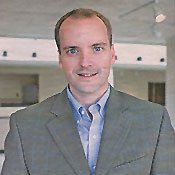Wednesday, March 23, 2011
"Sticks and stones may break my bones, but words will never hurt me." To be honest, I never liked that saying. I never liked it because it's not true. I think it should read instead, "Sticks and stones may break my bones, but words can break my spirit; words can cut to the heart."
According to Jesus, however, words can cause something worse.
In his book, "The Message: The Bible in Contemporary Language," Eugene Peterson paraphrases a portion of Jesus' Sermon on the Mount saying, "You're familiar with the command to the ancients, ‘Do not murder.' I'm telling you that anyone who is so much as angry with a brother or sister is guilty of murder. Carelessly call a brother ‘idiot!' and you just might find yourself hauled into court. Thoughtlessly yell ‘stupid!' at a sister and you are on the brink of hellfire. The simple moral fact is that words kill." (Matthew 5:21-22).
Whether words cut or kill, the truth is that words have a profound effect.
In the recent aftermath of the Arizona shootings, there was much talk about the use and availability of guns, but what I found more interesting were the questions of language. And while I believe strongly that we should limit gun rights, the questions of language and words revealed a deeper issue and presented a much different question.
Almost immediately, commentators and pundits suggested that the words of some incited the violence. Some pointed to the lack of civility in recent political discourse as a contribution. These questions no doubt prompted President Obama to stand before a Tucson assembly and say: "It's important for us to pause for a moment and make sure that we are talking with each other in a way that heals, not a way that wounds."
Did the words of others cause Jared Loughner to commit mass murder on January 8? I'm not sure we can ever effectively answer that question. But I do believe that we can say for certain that words caused Loughner to be the person that he is. I do not say that to excuse his actions but to suggest that words contribute greatly to our formation. Words can affirm us and build us up, but words can also break us and even kill us.
As a child, I struggled in school. My grades did not reflect my overall ability and intelligence. I knew it, my teachers knew it, and my parents knew it. What I do know now is that I suffered from an undiagnosed learning disability. I will never forget the words used to describe me: "lazy," "unmotivated," "dumb."
It was an English teacher named Pat Mitchell who saw the potential hidden from full view. She read my essays and poetry and called me "gifted" and "smart." I'm not sure if those words saved my life, but I know for a fact that they redirected my future.
I can't help but consider the woman in the Bible who was unable to stand up straight for 18 years. Her back was terribly contorted. She stared at the ground mostly. While scripture records many individuals by name, her name is simply and rather cruelly just "Bent."
Then she encountered Jesus. He healed her from her ailment, helping her to stand up straight. But I think the real healing occurred when she received a new name. Refusing to burden her with a label that only set her apart as different, he called her "Daughter of Abraham." That is when her life was changed and her future was redirected—not as a victim, but as a valuable member of the family of God (Luke 13).
Shane Claiborne is a member of a monastic community called the Simple Way, located in one of the poorest neighborhoods of Philadelphia, Pa. He tells of a particular day when he walked down the street with a young man, Kasim, who lived on his block. A group of teenagers confronted the two of them, looking for a fight. Attempting to make peace, Claiborne and his young friend introduced themselves and tried to make friends. Yet, as they walked away, one of the teens picked up a club, and hurling it in their direction, it hit Kasim on the head.
Angry and disappointed, Claiborne turned and called out, "You guys are created in the image of God, and you're made for something better than this!"
What impresses me is that he did not call them "bad" or label them "thugs." Instead, he called them "creations of God." Claiborne recalled that, at that point, the teens scattered in every direction. I can't help but wonder if his words literally did change their direction … for the good.
What words helped to form you into the person you are? What words wounded you or even stunted your growth? Our language can have a powerful impact on the lives of others, so as the president encourages, let us pause and choose our words more carefully.
Sticks and stones may break my bones, but words can heal.
Rev. Rob Hill is the pastor of Broadmeadow United Methodist Church in Jackson where he has served since June of 2005. A native of Forest, he earned his bachelor's degree from Mississippi State University in 1997 and a master's degree in divinity from Duke University in 2002.
